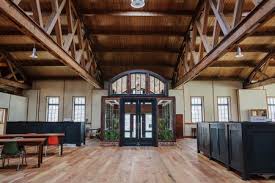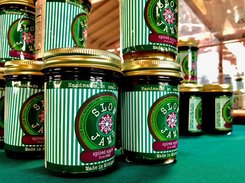Detroit is a cit abuzz with activity. There is a cohesive spirit of innovative enterprise to solve the problems that the people of this resilient city have been facing. It is “the hotbed of social enterprise”. However, even after spending 2 weeks in an environment so alight with new ideas I am unable to point to one concrete definition of social entrepreneurship. From what I have been able to glean so far, social enterprise is more than just a form of business - its more of a lifestyle, a change of mentality.
For many people this starts with the simple act of saying no. No to being satisfied with their current situation, no to just banal complaining and no to being afraid of venturing into a new area that they know nothing about. It starts with a gumption to be the change they want to see. As cliched as it sounds- more often than not Social Enterprise just stems from a need for things to work differently, with everyday mothers, retirees and bored youth looking for something new.
In the two weeks I have had plenty of time to talk to many of the food entrepreneurs associated with Detroit Food Academy as well as the brains behind Green Garage. There is one thing in common - they did not start out as crusaders with a utopian vision to single handedly change the world. They started out small , taking on step at a time and never being satisfied with what they had achieved. Impacting the lives was just a consequence of the larger goals of making things better than they were before.
Tom and Peggy started the Green Garage because they refused to believe that business and sustainability could be at odds with each other. After studying up on sustainability and “green” businesses they came up with a building that was in tandem with the environment around it and supported collaboration at all levels - with the environment as well as the people conducting business there. It not only houses many communally and environmentally conscious businesses but is also extremely energy efficient and eco friendly. Tom and Peggy’s insistence on making their idea be a reality has resulted in a space that serves as a clear contrast to the schism between commerce and the planet.
Be it the story of a mother who couldn't find the fresh taste for juices that she wanted for her children, or the parents who wanted to give their kids nutrition and taste through popcorns, social entrepreneurship sagas tend to be indicative of a fresh, quirky need to do things differently. As they progress, they make the communities around them a little happier, a little brighter and a little better.
So even though, I am still looking for a way to define social entrepreneurship cohesively, I am connected to it in more ways than one. It maybe a nebulous concept for me but it is no less inspirational and awe inspiring.
For many people this starts with the simple act of saying no. No to being satisfied with their current situation, no to just banal complaining and no to being afraid of venturing into a new area that they know nothing about. It starts with a gumption to be the change they want to see. As cliched as it sounds- more often than not Social Enterprise just stems from a need for things to work differently, with everyday mothers, retirees and bored youth looking for something new.
In the two weeks I have had plenty of time to talk to many of the food entrepreneurs associated with Detroit Food Academy as well as the brains behind Green Garage. There is one thing in common - they did not start out as crusaders with a utopian vision to single handedly change the world. They started out small , taking on step at a time and never being satisfied with what they had achieved. Impacting the lives was just a consequence of the larger goals of making things better than they were before.
Tom and Peggy started the Green Garage because they refused to believe that business and sustainability could be at odds with each other. After studying up on sustainability and “green” businesses they came up with a building that was in tandem with the environment around it and supported collaboration at all levels - with the environment as well as the people conducting business there. It not only houses many communally and environmentally conscious businesses but is also extremely energy efficient and eco friendly. Tom and Peggy’s insistence on making their idea be a reality has resulted in a space that serves as a clear contrast to the schism between commerce and the planet.
Be it the story of a mother who couldn't find the fresh taste for juices that she wanted for her children, or the parents who wanted to give their kids nutrition and taste through popcorns, social entrepreneurship sagas tend to be indicative of a fresh, quirky need to do things differently. As they progress, they make the communities around them a little happier, a little brighter and a little better.
So even though, I am still looking for a way to define social entrepreneurship cohesively, I am connected to it in more ways than one. It maybe a nebulous concept for me but it is no less inspirational and awe inspiring.


 RSS Feed
RSS Feed
